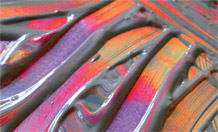
Painting created through Insider Art
Arts, health & wellbeing in Devon
On Friday 15th April the University of Exeter will host a free public exhibition as part of a project that examines the relationship between medicine and the modern arts. The exhibition explores interconnections between the arts, health and wellbeing in Devon and consists of exhibits by local arts and health organisations.
Exeter is one of the first places where psychological art therapies were used. Established at Countess Wear, the Withymead community was one of the first to experiment in combining psychotherapy and the arts. In response to people fleeing the blitz of 1942, the organisation continued to pioneer the arts therapy approach until the 1960s. Today this honourable history of arts and health in Devon has bloomed into many initiatives, some of which are outlined in the exhibition ‘Arts, Health and Wellbeing in Devon’. From humanising healthcare environments, to educational, psychological, community, social inclusion and special needs based approaches; the arts in Devon continue to serve the health and wellbeing of its people.
Samuel Goodman, postgraduate researcher in English at the University of Exeter said, ‘Medical Humanities is a growing area of academic research, but there is also a great deal of practice-based work undertaken in the local community by arts and health organisations. With this exhibition we want to show that, far from being an abstract subject, research on the relationship between arts and health has real life impact, and changes people’s lives’.
The exhibition is organised in conjunction with Arts and Health South West, Royal Devon and Exeter NHS Foundation Trust and Devon Partnership NHS Trust. It will display a broad selection of artwork and information about ten local organisations involved in providing arts and health related services. This includes Exeter Healthcare Arts, The Royal Devon and Exeter NHS Foundation Trust’s own charity which deliver environmental arts within the hospital. The Trust believes that using art in its public and treatment areas improves the hospital experience for patients and visitors, adding interest and distraction when people are unwell, distressed or worried.
The relationship between the University and these local health providers is a long-standing one. Another contributor, community arts-based organisation Magic Carpet, grew out of a community project initiated by the University of Exeter and focuses on involving vulnerable people to feel and become a part of their community through confidence-building projects. Insider Art, another local organisation which received support from the University in addition to other funders, uses art psychotherapy to humanise the healthcare system by improving the aesthetic environment and ensuring more relevant art within the healthcare setting.
The exhibition has been organised in conjunction with an academic conference entitled ‘From the Cradle to the Grave: Reciprocity & Exchange in the Making of Medicine and the Modern Arts’, which is funded by the Arts and Humanities Research Council and supported by the Wellcome Trust. In turn, the conference will raise money for local arts and health charity, Paintings in Hospitals. The conference involves early career academics and practice-based researchers working throughout a range of disciplines in organisations and universities across the UK and Europe. Experts from English, Theology, History, Drama and Modern Languages will focus on the way in which medicine and the arts have influenced each other across time and place and explore the ways both fields continue to interconnect.
Victoria Bates a postgraduate researcher in Medical History at the University of Exeter uses the arts to inform her understanding of medical issues in the 19th century that are not evident in ordinary medical text books and court records. Victoria explained: ‘The novels of Charles Dickens or the poetry of William Wordsworth can tell us more about historical approaches to childhood and puberty than many medical texts. Arthur Conan Doyle also worked in medicine while writing Sherlock Holmes and, as I study medical involvement in criminal proceedings, these links are really valuable. Popular books should not be underestimated as sources for studying the history of medicine.’
‘Arts, Health & Wellbeing in Devon’ is being held at the Thornlea Building on New North Road from 10am-3pm, Friday 15th April. Admission is free of charge, tea, coffee will be served at 11am and there will be an opportunity to discuss the work on display with artists and mental health practitioners involved.
Date: 12 April 2011
